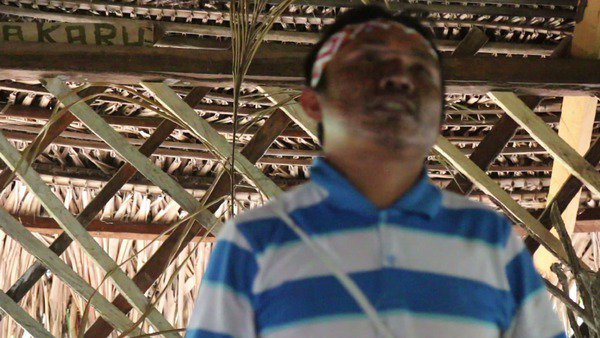Ernesto Neto and the Huni Kuin
dal 24/6/2015 al 24/10/2015
Segnalato da
24/6/2015
Ernesto Neto and the Huni Kuin
Thyssen-Bornemisza Art Contemporary - TBA21 Augarten, Wien
Sacred Secret. The exhibition unfolds as a pioneering experiment, establishing a zone of encounter with our 'ancestral futures', an investigation of the teachings of plants, and the spiritual nature of being.

Curated by: Daniela Zyman
Since the mid-1990s Ernesto Neto (b. 1964) has produced an influential body of work that explores constructions of social space and the natural world by inviting physical interaction and sensory experience. Drawing on biomorphism and minimalist sculpture, along with neoconcretism and other Brazilian vanguard movements of the 1960s and 1970s, the artist both references and incorporates organic shapes and materi-als—spices, sand, and shells among them—that engage all five senses, producing a new type of sensory perception that renegotiates boundaries between the artwork and the viewer, the organic and the man-made, as well as between the natural, spiritual, and social worlds. The journey that Neto, the Huni Kuin, and TBA21 have embarked on marks a crucial extension of the concerns that have been evident in Neto’s oeuvre over the past 20 years: a celebration of the sensuality of being, the unity of bodies and nature, and a longing for spiritual vision.
In collaboration with the members of the Huni Kuin, who will reside in Vienna for the preparation and initiation of the exhibition and enter into dialogue with Neto’s artistic language through a diversity of knowledge, expressions, and experiences, the artist mobilizes a deep understanding of indigenous wisdom and tradition and the relational and perspectival nature of the Huni Kuin’s world vision. Next to a central kupixawa – an ova or rituals tent – ceremonial and „magic“ objects will be presented in a display fabricated from Lycra and spiced with pepper and lavender and will both contextualize and seek to reverse the encyclopedic (re)presentation of indigenous artifacts and the objectification of knowledge in traditional museum settings. Neto’s new commission, combined with earlier major works by the artist from TBA21’s collection, demonstrate his long-standing dedication to divine forms and engage with an understanding of the body as part of the spiritual and material universe.
Likewise, Aru Kuxipa engages with the larger political issues driving the recognition of the rights of indigenous communities today: the importance of preserving common lands and of opposing the injustice and criminalization that indigenous communities face with respect to violated land rights and the destruction of their biodiverse habitat. The symposium The Rise of the Phyto Age, in particular, is devoted to these issues. In conjunction with the Una Isĩ Kayawa (“Book of Healing”), published in Portuguese and the Hatxa Kuĩ language by Editora Dantes, containing descriptions of the 109 plant species used in the indigenous therapies of the Huni Kuin and their curative properties, Aru Kuxipa „initiates“ the English translation of the book in Vienna and engages with the large universe of indigenous knowledge, which has been sidelined or exoticized for centuries.
Image: Ernesto Neto and the Huni Kuin, Sacred Secret
Press Contact:
Ema Kaiser-Brandstätter: ema.kaiser@tba21.org / T +43 1 513 98 56 55
Opening: Thursday, June 25, 2015, 7 pm
Thyssen-Bornemisza Art Contemporary–Augarten
Scherzergasse 1A, Vienna
Hours: Wednesday–Thursday noon–5pm,
Friday–Sunday noon–7pm



